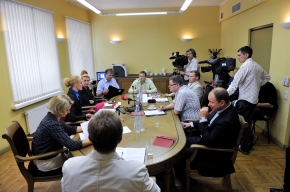 Gallery
Gallery
On Wednesday, 4 July the Mandate, Ethics and Submissions Committee of the Saeima commenced its work on the collective submission “Responsibility for breaching the Saeima members’ oath”, and assigned the Ministry of Justice to provide information on the domestic practice in cases where judges or employees of the State Audit Office breach their oath of office.
“This is the first instance of our citizens exercising their rights under Article 131.3 of the Rules of Procedure of the Saeima, i.e., the rights to file a collective submission with the Saeima. The Committee has also instructed the Ministry of Justice to study the experience of other countries in applying sanctions, including impeachment procedures, in cases when the oath of office has been breached,” said Vitālijs Orlovs, Chairman of the Committee.
The Ministry of Justice promised to provide the requested information within a month.
MP Lolita Čigāne (Unity) pointed out during the meeting that the parliamentarians’ oath is about moral and political responsibility and that there are many unanswered questions. For instance, is it right for the MPs to penalise their colleagues, who are representatives of the people elected by popular vote?
MP Kārlis Seržants (Union of Greens and Farmers) argued that the wording of the oath may be interpreted quite broadly. Therefore, two options should be considered – either to devise a more specific wording of the oath or to work out a procedure that would allow a certain number of MPs to submit a motion to expel an MP who has breached the oath.
MP Inese Lībiņa-Egnere (Reform Party), noted that the problem had been identified before and that finally the issue is defined in writing. The parliamentarians’ oath is a part of constitutional rather than declarative law. The oath consists of two parts – the first is devoted to caring for society as a whole, and the second part once again emphasises the high standards of law-abiding conduct expected of MPs. It is possible to consider introducing an impeachment procedure in Latvia in cases when the second part of the oath is breached, whereupon the case is brought before the Constitutional Court. As for demanding moral and political accountability, Inese Lībiņa-Egnere believes that it cannot be subjected to a legal framework.
Armands Geriks, representative of the authors of the collective submission, emphasised that the legislative initiative had received the support of 10,000 citizens within the first five days of filing. Currently, the number of signatories has already exceeded 13,000.
Participants of the meeting were united in welcoming the first collective submission as per the amendments to the Rules of Procedure of the Saeima adopted on 19 January, according to which citizens may turn to the Saeima with submissions supported by at least 10,000 signatories.
The collective submission should contain a request to the Saeima and a brief justification of the request; it should also specify the natural person authorised to represent the signatories of the collective submission. A collective submission may not contain a request which is clearly unacceptable in a democratic society or is plainly offensive, nor may it undermine values of human dignity, freedom, democracy, equality, the rule of law and human rights, including the rights of minorities.
Saeima Press Service







